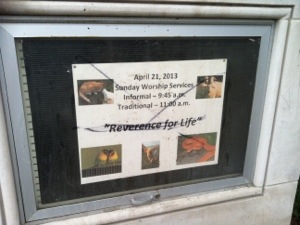Gordon E. Olsen, Professor of Theology at Baylor University, recently declared capital punishment a "heresy" and judged those who support it to be worthy of church discipline.
If Olson wishes to argue that our current justice system is not reliable enough to justify using the death penalty, he could make that argument. But that is not what he is doing here.
In "The Heresy of Capital Punishment" Olson (without a single Scripture reference) makes an absolute statement about what Jesus would do, setting the Son against His Father in the Noahic Covenant.
In the comments thread, one of the objections against using God's Covenant to support capital punishment goes, "if we use Moses to support capital punishment, we must also advocate killing adulterers, rebellious children and witches."
Not so.
In the Mosaic Covenant, God made a covenant with the Hebrew nation. In the Noahic Covenant, God made a covenant with all of mankind. In this covenant, God makes it clear that because of the preciousness of "imageo Dei" (the image of God) the taking of a human life warrants a punishment in kind.
Genesis 9:5-6
And for your lifeblood I will require a reckoning: from every beast I will require it and from man. From his fellow man I will require a reckoning for the life of man.
“Whoever sheds the blood of man,
by man shall his blood be shed,
for God made man in his own image
Genesis 9:11-12
I establish my covenant with you, that never again shall all flesh be cut off by the waters of the flood, and never again shall there be a flood to destroy the earth.” And God said, “This is the sign of the covenant that I make between me and you and every living creature that is with you, for all future generations
God prescribed the death penalty, in the Noahic Covenant, for those who shed the blood of humans, whether man or beast, with the rainbow as the sign and seal, for "ALL FUTURE GENERATIONS" We find no mention of adultery, witches, rebellious children in this covenant with mankind, for all future generations.
The ESV Study Notes says here:
Human life is to be valued so highly that it is protected by this system of punishment because God made man in his own image, and so to murder another human being is to murder what is most like God, and is thus implicitly an attack on God himself. Many would see this statement as establishing the moral principle permitting the death penalty in cases of murder—with the understanding that the person charged would have been justly tried and his guilt established beyond any reasonable doubt (cf. the OT requirement of two or three witnesses, Deut. 19:15; repeated in the NT, e. g., Matt. 18:16; Heb. 10:28). A further requirement is that such a death- penalty verdict must always be carried out under the jurisdiction of the established authorities (cf. Deut. 19:15–21; Rom. 13:1–5). The difficulty of establishing guilt beyond any reasonable doubt and the difficulty of ensuring justice in a modern, complex urban society (as compared to an ancient village- based society) underscore the great care and caution that must be taken in applying this principle today.
This study note is important because Olson repeatedly ascribes "blood lust" to those who support capital punishment. This shows a lack of understanding between personal retribution and an adjudicated verdict carried out under the jurisdiction of the established authorities.
In the face of God's covenant with "all future generations," the accusation of "heresy"seems misplaced. But he does make the accusation, teaching that he believes supporting capital punishment should be addressed through "church discipline."
"Sin" is addressed through church discipline...church discipline ends with excommunication and being treated as an unbeliever (Matt. 18:15-17.). The brunt of Olson's teaching says that those of us who believe that God's covenant with all of mankind, and all future generations says that: “Whoever sheds the blood of man, by man shall his blood be shed, for God made man in his own image" are in sin.
Olson writes:
I believe Christian churches of all kinds ought to do more to oppose capital punishment. They ought, at the very least, to declare it incompatible with Christian faith and put members who openly believe in it under some kind of discipline (not necessarily excommunication but at least forbidding them to teach it in the ecclesial context). And those who practice it, actively seeking it and participating in it, should be excommunicated from Christian churches. It ought to be a matter of status confessionis—as apartheid was declared by the World Alliance of Reformed Churches which helped lead to its downfall in South Africa.
There are three segments to the above paragraph. We can call it the "doctrine of shut up"
1 - declare "it" incompatible with Christianity (shut up
2 - or come under church discipline (or we'll make you shut up)
3 - status confessionis - (if we can't make you shut up, we'll kick you out.)
Kevin DeYoung said, about "status confessionis:" It means that a particular doctrine is essential to who we are as a church. If something is status confessionis it means this is a make or break issue. It means that the church will not tolerate others views on this matter.
So, in short, God the Father, in the Noahic Covenant with mankind, for all future generations says, "Whoever sheds the blood of man, by man shall his blood be shed, for God made man in his own image."
Roger Olson says, "we should not tolerate that."

